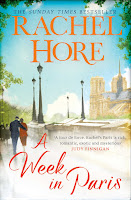 |
| (Amazon UK link) |
As with many recent books, this story takes place in two separate time periods, and the plot involves the gradual uncovering of some secrets in the past. But this is a little different from many in that the ‘past’ section of the book takes place in France before and during its occupation by Nazi forces in the 1940s.
Fay is the main viewpoint character. We meet her first when she is sixteen, in 1956, on a school trip to Paris. She is pretty sure she has never been there before, but various places seem to trigger a sense of deja vu. When she gets home she asks her mother, Kitty, if she has ever been to Paris, but Kitty is very reticent about the past. Fay’s father Gene died during the war and her mother still grieves for him; Fay doesn’t like to push her to talk about her early childhood, or the events surrounding her father’s death.
Then the book moves forward a few years, to 1961. Fay, in her early twenties, is now a talented violinist, about to go on a concert tour to Paris. Her mother is convalescing in hospital, after a psychiatric incident, and Fay is very concerned about her. There are clearly events in the past which Kitty has been keeping to herself, which are disturbing her seriously.
The bulk of the book takes place during Fay’s week in Paris. She plays in concerts, and also follows up a clue which her mother gave her when she last saw her. This takes her, eventually, to a woman called Nathalie who knew Kitty in the 1940s, and who also knew Fay as a child. And over the course of three afternoons, Nathalie gradually tells Fay about her early childhood. Nathalie apparently knew Kitty - or knew all about her - when she first went to study the piano in Paris, and tells the story of her meeting and falling in love with Gene.
The way the book is written is clever, slowly building up a picture of Kitty’s life as a young adult, and the birth of Fay, alongside the growing concerns about war. I’m not usually very keen on war-related books, but this one stays character-based, not skating around some of the terrible issues of war, but seeing events from a civilian point of view. I could feel Kitty’s fears, her worries for her daughter, and her terror of losing her husband. He is a doctor, but it becomes clear that he’s also involved in some underground activities.
I’m not sure I had ever before understood even a little of what it must have been like for people living in France while it was occupied; the daily terror of interrogation, the gradual disappearance of Jews, the suspicion of neighbours. I had not appreciated, either, that the rationing and availability of food in Paris was even worse than it was in the UK during this period. Rachel Hore, who is apparently a historian anyway, has done her research extremely well. She sets the scenes in a way that seem authentic to me, without being overtly educational. It's the small, sensory details that keep it realistic.
Fay as a young adult is a likeable person, although I didn’t find her entirely three dimensional - and while I could relate a bit better to Kitty, I never did understand why she told Fay nothing at all about her early childhood. There’s a low-key romantic thread too; Fay bumps into Adam, a young man she met when she was sixteen, in what is perhaps too much of a coincidence for reality. But it’s not impossible, and it happens early enough in the book that it didn’t matter.
I worked out who Nathalie was, in the narration, long before Fay did. And I had also guessed the incident that both Nathalie and Kitty are unwilling to tell her, so when it is revealed there is no sense of surprise. I had guessed early on what the initial, nameless prologue referred to, too; it’s neatly finished in an epilogue, but, again, there is nothing unexpected. If I have a slight gripe with the book it's that there are too many hints and too much introspection which then stop any element of surprise when the answers appear.
But overall I thought it a powerful, moving book. It’s very well-written, and the ending, albeit predictable, is entirely satisfactory.
Definitely recommended.
Review copyright 2019 Sue's Book Reviews
No comments:
Post a Comment